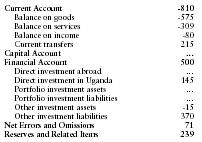Uganda - Balance of payments
Uganda had a favorable balance of payments in the 1930s and throughout the postwar years—an unusual feature in an underdeveloped country. The favorable balance with the rest of the world, however, was diminished by deficits in trade with Kenya and Tanzania following independence. Uganda's payments position declined during the 1960s, and during the 1970s, years of deficit outnumbered those of surplus; moreover, the deficits were larger than the surpluses. Poor trade performances and mounting debt service led to a loss of reserves in the 1980s. From 1986 to 1990, merchandise exports fell by 56% (due largely to plummeting coffee prices), while merchandise imports increased by 30%, so that the trade deficit widened rapidly from $69 million to $440 million in just a few years. Trade deficits continued through the 1990s. Low levels of foreign investment, coupled with weak coffee exports, led to a decline in foreign exchange reserves and a deteriorating balance of payments position in the early 2000s.
The US Central Intelligence Agency (CIA) reports that in 2001 the purchasing power parity of Uganda's exports was $367 million while imports totaled $1.26 billion resulting in a trade deficit of $893 million.
The International Monetary Fund (IMF) reports that in 2001 Uganda had exports of goods totaling $452 million and imports totaling $1.03 billion. The services credit totaled $183 million and debit $492 million. The following table summarizes Uganda's balance of payments as reported by the IMF for 2001 in millions of US dollars.

| Current Account | -810 |
| Balance on goods | -575 |
| Balance on services | -309 |
| Balance on income | -80 |
| Current transfers | 215 |
| Capital Account | … |
| Financial Account | 500 |
| Direct investment abroad | … |
| Direct investment in Uganda | 145 |
| Portfolio investment assets | … |
| Portfolio investment liabilities | … |
| Other investment assets | -15 |
| Other investment liabilities | 370 |
| Net Errors and Omissions | 71 |
| Reserves and Related Items | 239 |
Comment about this article, ask questions, or add new information about this topic: